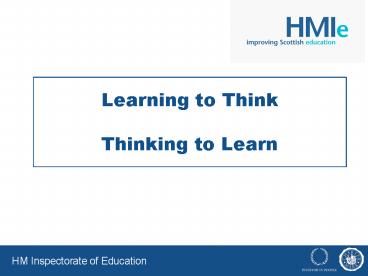Learning to Think Thinking to Learn - PowerPoint PPT Presentation
1 / 15
Title:
Learning to Think Thinking to Learn
Description:
To encourage pupils to put forward their own ideas, views and arguments ... Lynn Dawes, Neil Mercer and Rupert Wegerif, Thinking Together: a programme of activities ... – PowerPoint PPT presentation
Number of Views:151
Avg rating:3.0/5.0
Title: Learning to Think Thinking to Learn
1
Learning to ThinkThinking to Learn
HM Inspectorate of Education
2
The Thinking School
- Learning requires thinking
- creative thinking,
- critical thinking,
- problem solving and
- decision making.
- Good thinking can be developed by all pupils
3
Thinking Skills WHY?
- To encourage pupils to put forward their own
ideas, views and arguments - To encourage pupils to deepen their understanding
of particular concepts by focusing on certain
skills and processes - To encourage pupils to develop and use a range of
skills and strategies to improve their learning.
4
Thinking Styles
Children use many different styles of thinking
to understand their world.. Children need to
predict and guess long before they feel they have
all the relevant information.. They have no
choice but to be divergent. Later they learn the
particular style of concentration on the matter
in hand that underlies academic enterprise.. Yet
those who have learned how to refine their minds
with the logic of a closed system..will be the
first to point out the need for the creative act,
for intuition, for the chance associations that
cannot be drawn at will. Cedic Cullingford, The
Nature of Learning, Cassell, 1990
HM Inspectorate of Education
5
Curriculum guidelines (current!)
- identify and select relevant information
- sort, order and classify information
- clarify and reflect on ideas, experiences and
opinions - generate ideas, questions and hypotheses
- give reasons for opinions, actions and decisions
6
Curriculum guidelines (current!)
- draw conclusions
- identify problems
- plan
- judge
- make evaluations
7
Thinking towards the Future
- Effective thinking skills will enable young
people to become - successful learners
- confident individuals
- responsible citizens
- effective contributors to society
8
More than just skills!
- creative and critical thinking
- strategies for improving memory, understanding,
and problem solving - processes such as think-pair-share and the
community of enquiry approach to discussion and
debate - procedures for helping pupils to reflect on their
own thinking - measures to create the right climate for thinking
in the classroom and in the school as a whole - styles of thinking and learning
HM Inspectorate of Education
9
Thinkers in the Classroom?
- Convergent and divergent
- Convergers, divergers, accommodators and
assimilators - Visual, auditory, kinaesthetic
- Vertical and lateral
- Visual, auditory, kinaesthetic
HM Inspectorate of Education
10
Learning Styles
there are a whole number of learning styles that
teachers are advised to take into account..
However, while a number of these tips make
intuitive sense there is very little research
that suggests that teaching to different learning
styles actually improves students
achievement. Spending a lot of time, effort (and
money) on instruments designed to measure
different styles, and then trying to match
teaching to each students individual learning
preferences, is probably not worth the
effort. David Reynolds, Effective Teaching
Evidence and Practice, Paul Chapman, 2001
HM Inspectorate of Education
11
The research showed clear evidence of a link
between the development of childrens ability to
communicate and the improvement of their critical
thinking and decision making Lynn Dawes, Neil
Mercer and Rupert Wegerif, Thinking Together a
programme of activities for developing thinking
skills at KS2 Questions publishing, 2000
HM Inspectorate of Education
12
Both the theory and the experience.indicate
that gains in cognitive development lead to gains
in academic achievement. Children who think
better, learn better. Philip Adey, Lets Think!
Teachers Guide 2001
HM Inspectorate of Education
13
Developing Thinking Skills
- Put forward their own ideas, views and arguments
- Think more deeply about content and concepts
- Develop skills and strategies
- Reflect on their own thinking and learning
HM Inspectorate of Education
14
The Evidence
There is evidence that the more time teachers
spent asking questions the greater the positive
effect upon progress. Furthermore the more
teachers were able to make use of higher-order
questions and statements (those designed to
elicit problem solving, reasoning or imaginative
responses) the better the progress made. Peter
Mortimore, School Matters, Open Books, 1989
HM Inspectorate of Education
15
Thinking Towards the Future
- Effective thinking skills will enable young
people to become - successful learners
- confident individuals
- responsible citizens
- effective contributors to society
HM Inspectorate of Education































